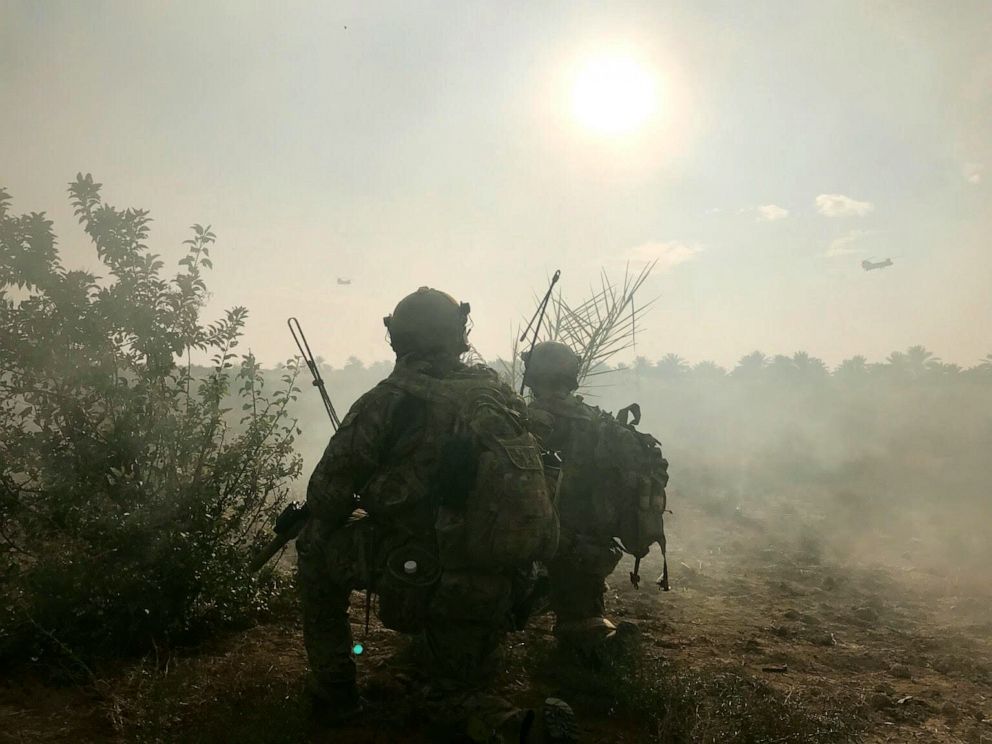US military resumes operations against ISIS in Iraq after pause due to Iran tensions
The move comes despite a vote by the Iraqi parliament to expel US troops.
After a two-week pause, the U.S. military has resumed joint operations with Iraqi forces against the Islamic State, according to two U.S. officials and an Iraqi official.
The move comes despite a vote by the Iraqi parliament to expel American troops from the country, but amid growing concerns the terror group could take advantage of any lull to reconstitute.
The U.S.-led coalition paused operations on Jan. 5, with the Pentagon saying American personnel needed to reinforce security at Iraqi bases with coalition troops, which had come under repeated rocket attacks by an Iranian-backed militia group. The notice also came days after a U.S. drone strike killed Iranian Gen. Qassem Soleimani, igniting calls by Tehran and its Shiite militias for revenge against the United States.
American forces across Iraq were at a heightened state of alert for possible retaliation, which came last week when Iran fired more than a dozen ballistic missiles at two Iraqi bases that house U.S. troops.

While there have been sporadic rocket attacks across Iraq in the week since, tensions between Washington and Tehran have eased, with President Donald Trump saying the day after the missile strikes on U.S. troops that Iran "appears to be standing down."
Chief Pentagon spokesperson Jonathan Hoffman could not confirm a resumption in the fight against ISIS in Iraq but told reporters on Thursday, "We'll have an announcement soon" on any resumption. He said U.S. forces are still co-located and doing planning with their Iraqi counterparts but "specific field activities and operations do not take place."
However, one U.S. official told ABC News that the coalition and Iraqi Counter Terrorism Service conducted a joint mission against ISIS on Wednesday.
The coalition did not respond to requests for comment. A spokesperson for the head of the Iraqi Armed Forces said that no approvals had been granted to the U.S. to resume military operations.
During the pause, the coalition still conducted missions against ISIS in Syria, where the terror group also has pockets of fighters looking to reconstitute.
Military actions taken by the U.S. and Iran have played out on Iraqi soil, leaving Baghdad in a precarious position caught between two allies.
The U.S. partnered with Iraq beginning in 2014 to take back territory from ISIS' control, and today, more than 5,000 U.S. troops train, advise and assist the Iraqi security forces in making sure ISIS doesn't regain a swath of territory in the country.
But Iran, a fellow Shiite majority country and Iraq's powerful eastern neighbor, holds significant sway over the Iraqi government and the Shiite militias that are nominally under Iraqi government control but pose a threat to U.S. forces. Soleimani helped lead those militias against ISIS, making him a hero in Tehran and Baghdad.
Taken without Iraqi permission on Iraqi soil, the U.S. drone strike that killed Soleimani has now galvanized support among Shiite politicians, including acting Prime Minister Adil Abdul-Mahdi, to push American troops out. Mahdi led the Shiite majority in parliament on Jan. 5 in passing the non-binding resolution to expel all foreign forces, and since then, Mahdi has signaled publicly that he wants to enforce it.
Despite that vote, senior U.S. officials, including Secretary of State Mike Pompeo, have publicly said the U.S. has no intention of leaving Iraq, let alone negotiating a withdrawal agreement.
"We're still in conversations with our Iraqi hosts," Hoffman said Thursday at the Pentagon, adding, "At this time there are no plans by the U.S. military to withdraw from Iraq. Consensus in Iraq seems to be that the United States forces are a force for good. Our hope and our goal is for U.S. security forces to remain in the region and remain in Iraq."




